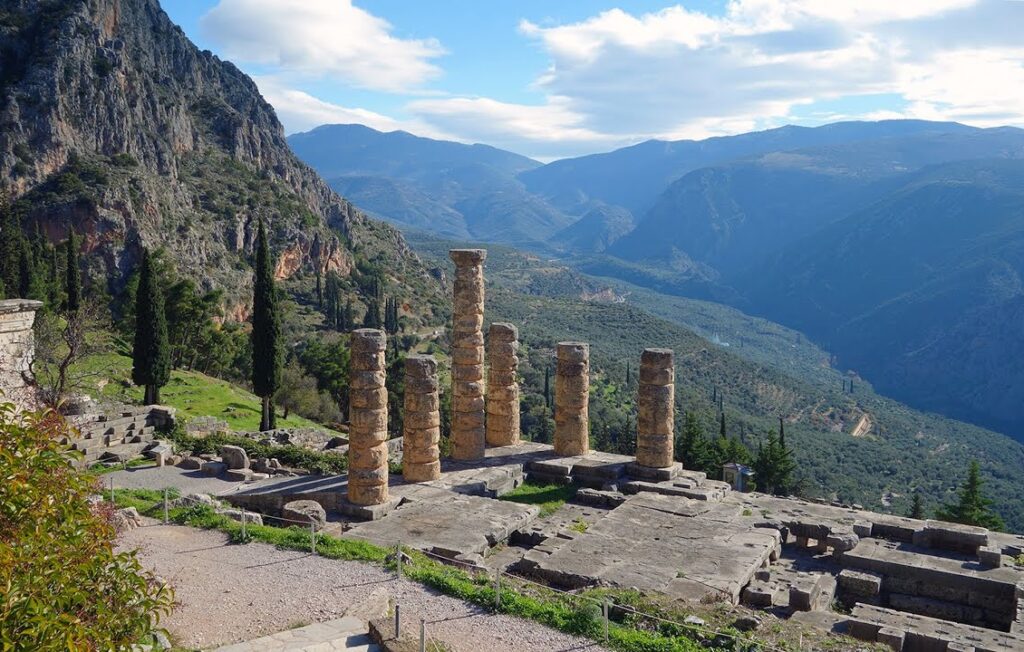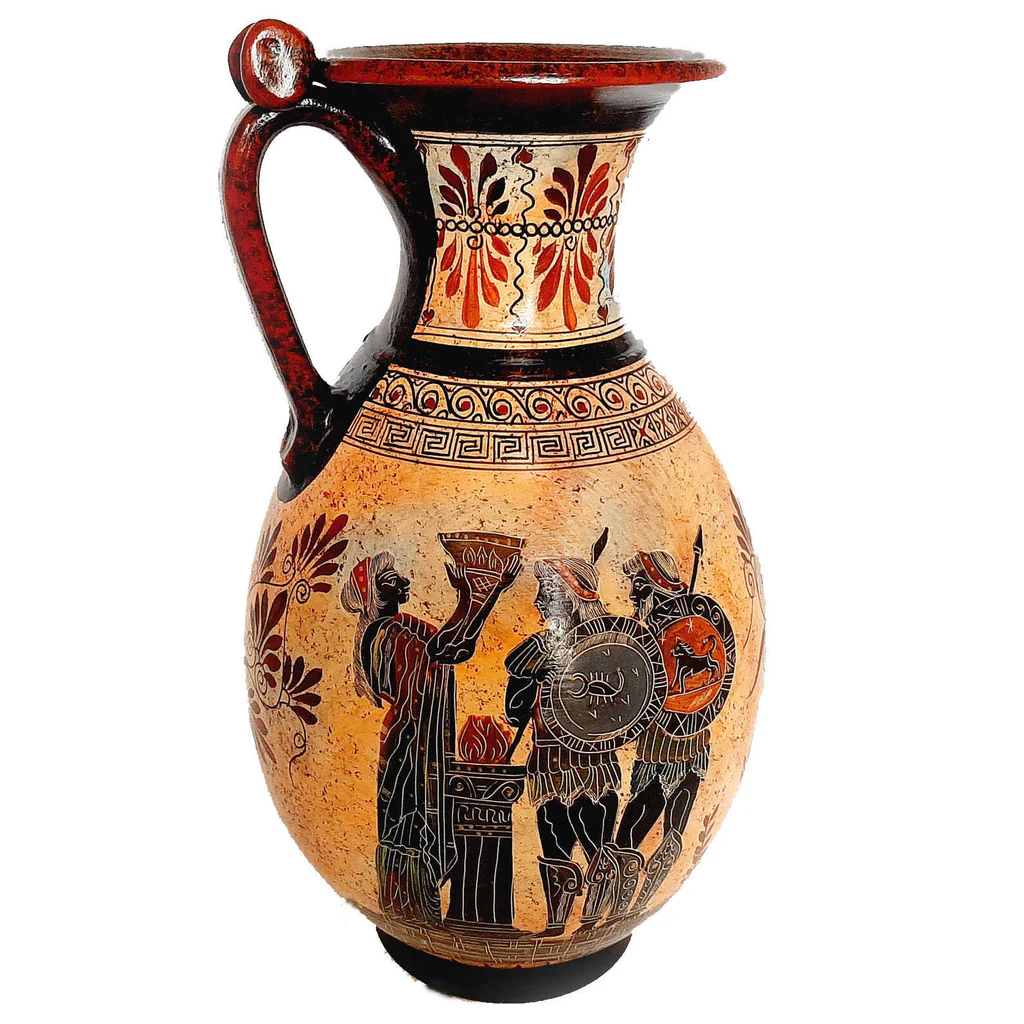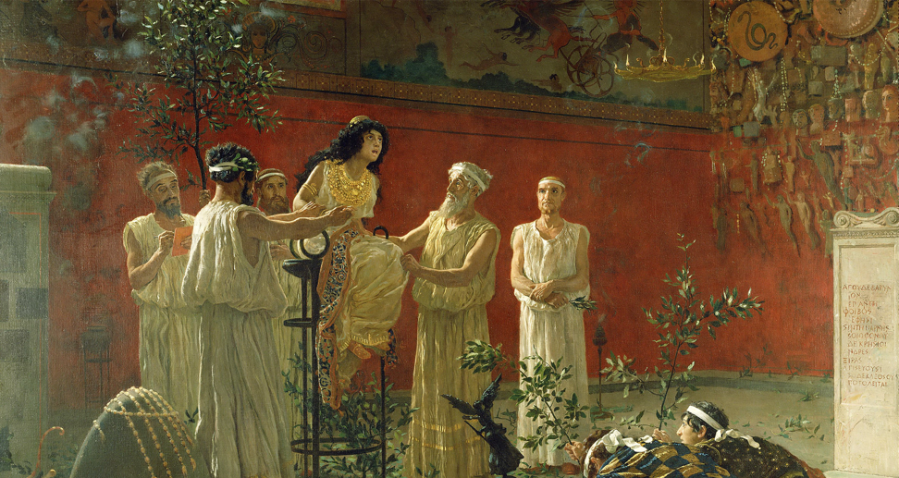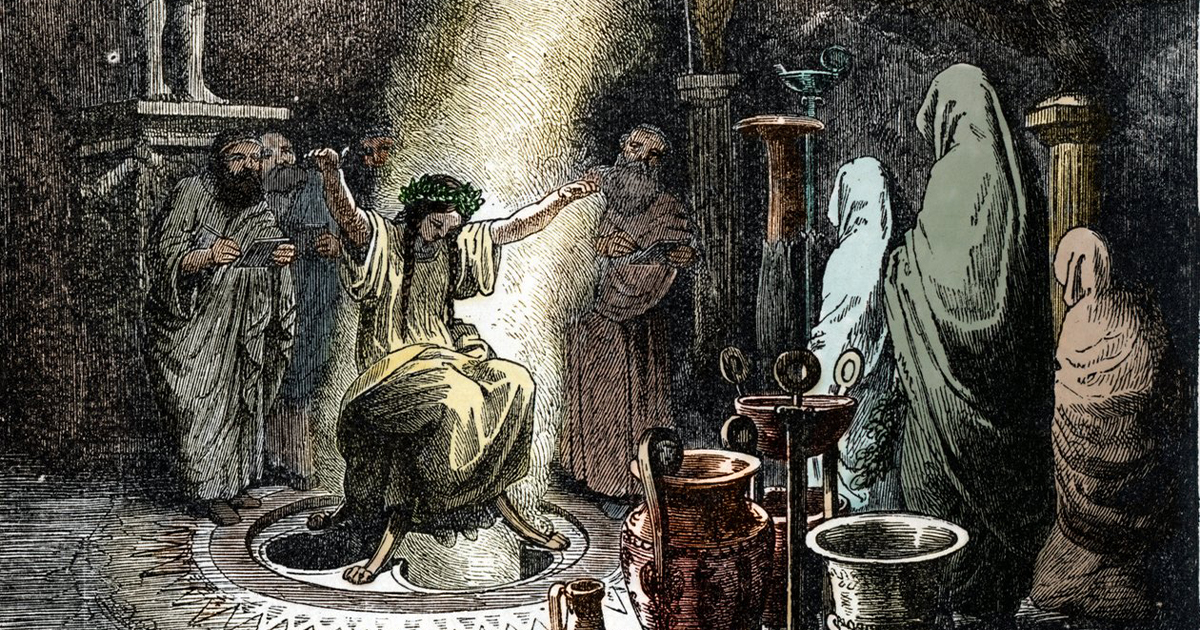Stone, Smoke, and the Voice of Apollo
Steep, terraced limestone catches morning light on the southern slope of Mount Parnassus. The air smells of pine resin and thyme, and a spring called Cassotis murmurs below the ruins of a temple colonnade. For more than a millennium pilgrims climbed this sacred ledge to hear a single woman speak. She was the Pythia, mouthpiece of Apollo, and her cryptic hexameters could launch fleets or halt armies. Marble blocks still bear the thankful graffiti of merchants and monarchs who believed her words changed their fortunes. Delphi was no provincial shrine; it stood at what Greeks charted as the omphalos—the center of the world—marked by a navel‑stone said to have been dropped by Zeus’s eagles.

Birth of a Cult and Its Odd Geography
An earlier Earth‑goddess, perhaps Gaia, seems to have ruled this cliff before Apollo displaced her in myth by slaying the serpent Python. That conquest, retold on temple pediments, masked a political shift: tribes of central Greece elevating a solar archer over chthonic spirits, aligning the sanctuary with emerging city‑states rather than local shepherd clans. Delphi’s inaccessible cliffs made it a neutral zone. Spartans, Athenians, Thessalians—none held the high ground, so all accepted its judgments. A league of nearby towns, the Amphictyony, guarded the site and staged the Pythian Games every four years; athletic victors earned crowns of laurel, echo of the tree sacred to the archer god.
Questioners and Ritual Steps
A consultation unfolded like drama. Petitioners queued below the sacred precinct before dawn. A goat, sprinkled with spring water, must shiver—proof that Apollo was “in residence.” If the animal stood indifferent, the prophetess would not speak that day, and suppliants scattered to inns in the little town of Krisa. When omens favored speaking, priests led the goat to the altar, slit its throat, and burned thigh flesh on thyme‑fed fire. Only after shrine coffers received a pelanos fee—higher for kings than farmers—could the chosen questioner ascend the temple’s eastern steps.
Inside, the adyton chamber lay below floor level. The Pythia, a local woman past middle age, wore a simple wool gown and laurel garland. She sat on a bronze tripod over a crevice from which sweet, slightly sulfuric fumes reportedly rose. Modern geologists have identified fissures exhaling methane and ethylene; in low doses ethylene induces euphoria and dreamy speech. Ancient observers noted altered breathing, a distant gaze, then verse tumbling from her lips. Nearby priests—hosioi—transcribed ragged syllables into polished dactylic hexameters, presenting them as Apollo’s response.

Speech That Moved Gold and Steel
Because answers reached beyond parochial cult, shrines from Libya to the Black Sea sent envoys with bronze hydriae packed with coins. Some oracles specialized in healing, others in marriage omens; Delphi’s stock‑in‑trade was statecraft. Her messages balanced authority with ambiguity, letting Apollo remain infallible while mortals bore blame for misreading. In practice, that very vagueness granted rulers political cover. A king who triumphed could trumpet divine endorsement; one who failed could claim he misunderstood.
King Makers and Empire Breakers
Croesus of Lydia (547 BCE). Rich beyond measure, Croesus tested oracles by asking what he was doing on a random day. Delphi alone answered: cooking tortoise and lamb in a bronze pot—an improbable dish Croesus happened to be preparing. Convinced, he paid Delphi more gold than the treasuries could shelf and asked whether war with Persia would succeed. The oracle said a great empire would fall. Croesus attacked, and indeed an empire collapsed—his own. Herodotus preserves the king’s rueful admission that “the god spoke truth yet I failed to grasp it.”
Lycurgus and Spartan Law. Earlier still, a Spartan noble named Lycurgus supposedly received from Delphi the charge to craft a constitution. The Great Rhetra mandated equal land allotments, iron money, and communal meals. Whether Lycurgus existed is debated, but by anchoring reforms in Apollo’s voice, Spartan rulers insulated harsh laws from local dissent for centuries.
Athenian Sea Walls and the Wooden Wall Prophecy (480 BCE). As Xerxes marched south, Athenians asked Delphi whether they should resist. The first answer dripped doom; priests begged Apollo for clarity and received a second: “Trust in the wooden wall; divine Salamis will wreath sons of women.” Themistocles argued the words meant ships, not palisades. Persuaded, Athens evacuated and bet on her fleet. Victory at Salamis checked Persian expansion and preserved the experiment called democracy.
Foundations of Colonies. When Greeks sought grain or trade, they first sought Delphi. The Pythia picked departure days, founding oaths, even city plans. Syracuse, Byzantium, Cyrene—all carried tablets citing Apollo as urban planner. Such sanction eased fears of angering local gods abroad.
Roman Reverence and Appropriation. By the 2nd century BCE, Roman generals queued behind Greek envoys. Plutarch, who later served as priest at Delphi, recounts that Nero carted away five hundred bronze statues yet still offered gifts. Hadrian rebuilt portions of the sanctuary; his coins show the emperor holding a tiny omphalos, branding himself heir to Hellenic wisdom.

Prophecy as Soft Power
The Amphictyonic Council used oracle prestige to police warfare around the sanctuary. Violators of “sacred ground” faced collective punishment, sometimes called Sacred Wars. In 356 BCE, Philip II of Macedon entered one such conflict on Delphi’s side, granting him pretext to march south and later dictate peace terms to Athens and Thebes. Oracle sanction thus functioned like a bronze‑age United Nations endorsement, conferring legality on conquest.
City treasuries erected along the Sacred Way became billboard‑politics in marble. Athens displayed gold‑tipped Persians shields; the Siphnian Treasury flaunted Parian marble friezes paid for with island silver. Each façade murmured a message: “Our gifts were accepted; our fortunes please the god.” Rivals read those stones as carefully as later diplomats read communiqués.
Inside the Mind of the Priestess
The Pythia’s identity changed, but her social role remained: a local woman, often widowed, selected for purity rites. She fasted, chewed laurel, and inhaled vapors that neuroscience now likens to mild anesthetic rather than full delirium. French archaeologist Georges Roux, excavating in 1892, found a natural bitumen‑laden spring under the temple. Analysis in 2001 identified ethylene traces—explaining altered speech without invoking fantasy. Writings of Plutarch, himself a Delphic priest, describe the oracle’s voice as “not her own, yet not wholly other,” implying partial agency rather than puppet trance.
While some later Christian polemic painted the Pythia as fraud high on burning bay leaves, records show consultations limited to about nine days a year—the first of each month except winter—suggesting measured, not frantic, proceedings. Fees, goat tests, and priestly mediation gave the sanctuary control levers: choose ambiguous phrasing, refuse a question, or delay until omens looked favorable, thus preserving reputation.
Decline and Final Silence
By late Roman times, competition from Eastern mystery cults, tariffs on temple estates, and earthquakes eroding the cliff weakened Delphi’s reach. Theodosius I, enforcing Christian orthodoxy, outlawed sacrifices in 394 CE. Basin fires went cold; the last recorded oracle muttered that Apollo’s laurel had withered, his springs gone dry. Villagers cannibalized marble for churches; snow buried the stadium. Yet medieval travelers still called the ravine Kastri—a ghost of Cassotis spring—showing memory survived in place‑names.
Archaeology Lifts the Veil
French teams under the 1891 Ottoman‑granted concession relocated the entire village downhill to peel back centuries of debris. They mapped treasuries, traced water conduits, and found lead curse tablets naming lost court cases. One inscription near the temple door lists consultants by dialect, proof that even in decline Delphi spoke to Magna Graecia Italiots and Black Sea traders. A 2005 geochemical survey confirmed intersecting fault lines beneath the adyton, each seeping gases. Where myth told of Python’s breath, geology whispered hydrocarbon chemistry.
Echoes on Modern Stages
Every courtroom oath, every leader’s “mandate of heaven” speech, borrows something from those triple‑footed verses in which certainty hid behind layered meaning. Data analysts craft forecasts; pollsters weigh sentiment; yet leaders still crave a voice that both guides and absolves. Delphi offered that service wrapped in godly grandeur. Her riddles taught critical listening: sweat the grammar, note the verb tense, ask what is unsaid. Croesus heard promise; Apollo hedged liability. Themistocles heard hope in plank and sail; Salamis rewarded his ear.
- Diplomacy. Shuttle‑negotiations borrow Delphi’s neutrality principle: host talks where no party holds home‑field advantage.
- Messaging. Ambiguous phrasing can sustain authority across factions, though at cost of clarity. Political speechwriters know the oracle’s toolkit well.
- Science of altered states. Research into trance, meditation, and psychedelics finds precedent in the Pythia’s laurel‑scented inhalations.
- Gendered voice of power. In patriarchal Greece, the most authoritative public voice was female. That paradox still sparks essays on charisma and ritual.
Marble Fragments Carry Human Breath
Stand today at the theater crest above the temple. Cicadas saw at the pines; the Gulf of Corinth glints like a fallen shield far below. Stone rows where fifth‑century listeners once debated riddles now host tourists brushing away dust to sit where Aeschylus might have listened for the god. The spring still sings under grates, cold even in August heat. No priestess climbs the tripod, yet oracles echo in policy memos, horoscope apps, and algorithmic predictions. The need never died; only the mask changed.
